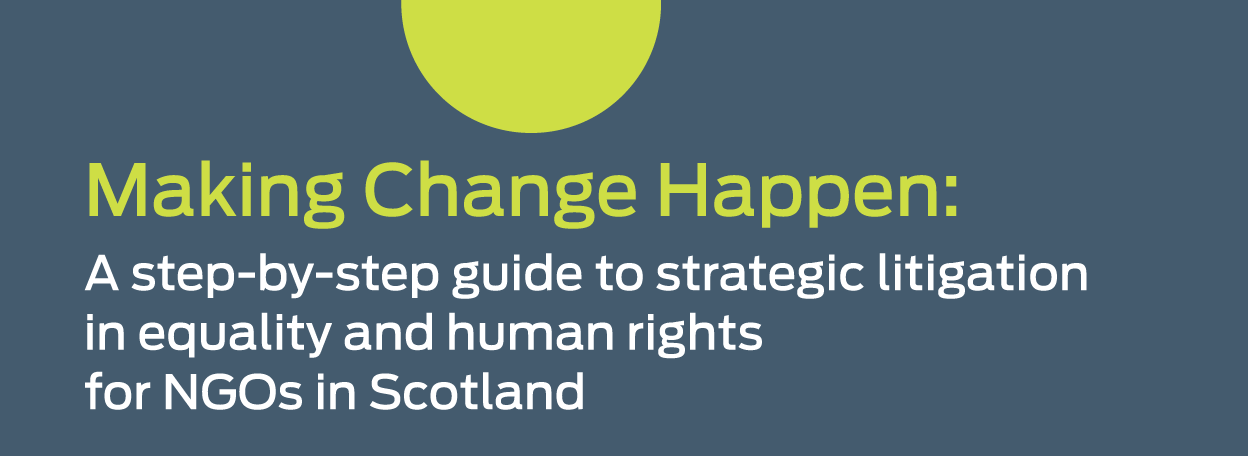Role of the Equality and Human Rights Commission
The Equality and Human Rights Commission (EHRC) is a GB-wide equality body and recognised as a National Human Rights Institution (NHRI) by the United Nations. It has a statutory role to safeguard and enforce equality and human rights laws to protect people’s rights to fairness, dignity and respect.
The EHRC Scotland is interested in hearing from NGOs and others who are bringing equality or human rights cases that might be of strategic importance.
The EHRC can use its legal powers in various ways:
The EHRC Scotland is interested in hearing from NGOs and others who are bringing equality or human rights cases that might be of strategic importance.
The EHRC can use its legal powers in various ways:
Judicial Review - If the EHRC think that a public body has taken a decision or acted (or failed to act) in a way that breaches the Equality Act 2010 or the Human Rights Act 1998, they can begin the process of judicial review.
Usually a judicial review under the Human Rights Act can only be taken by a victim. However, the EHRC has the powers to bring a judicial review in their own name.
Examples of situations where the EHRC, rather than a victim, might bring a claim include:
Public Interest Intervention -The EHRC has frequently intervened in cases within the UK and at the European Court of Human Rights. They intervene in cases which raise issues affecting vulnerable groups clarify important questions of law or raise serious issues of policy or abuse by a public body.
Legal Support and Advice - The EHRC’s Adviser Support service offers frontline agencies and solicitors access to high quality advice on equality and human rights issues.
Funding - The EHRC can offer funding to a solicitor to run a discrimination case or funding for other costs such as getting a 'legal opinion'.
Inquiries - If the EHRC receive several requests on related issues, they have the statutory power to hold an inquiry into an issue of equality or human rights. Where an issue relates to human rights, they always work closely with the Scottish Human Rights Commission.
The EHRC take many factors into account when deciding the extent to which they will get involved with a legal case – you can find more details of how they decide what is strategic here.
If you are an adviser or a solicitor dealing with a discrimination issue, it can be useful to discuss your strategic issue with the EHRC at an early stage and explore the potential for the EHRC to support any legal action. You can find contacts for the EHRC Scotland in the Resources section.
Usually a judicial review under the Human Rights Act can only be taken by a victim. However, the EHRC has the powers to bring a judicial review in their own name.
Examples of situations where the EHRC, rather than a victim, might bring a claim include:
- If the government announces that it is going to introduce a change in the law which the EHRC believes will lead to violations of people’s human rights, the EHRC can threaten judicial review before the legislation is passed or within 3 months of enactment. For example, when the UK government proposed extending the time for the detention of terrorist suspects to 42 days without charge, the EHRC threatened judicial review and the proposal was dropped.
- Where the subject matter of the case is one where the EHRC is best placed to bring the claim because of its particular expertise
- Where there are multiple victims whose experience can be used to illustrate a problem but where a claim brought by any one of them would not tell the whole story, or
- Where the actual or potential victims do not have access to lawyers or cannot fund a claim themselves.
Public Interest Intervention -The EHRC has frequently intervened in cases within the UK and at the European Court of Human Rights. They intervene in cases which raise issues affecting vulnerable groups clarify important questions of law or raise serious issues of policy or abuse by a public body.
Legal Support and Advice - The EHRC’s Adviser Support service offers frontline agencies and solicitors access to high quality advice on equality and human rights issues.
Funding - The EHRC can offer funding to a solicitor to run a discrimination case or funding for other costs such as getting a 'legal opinion'.
Inquiries - If the EHRC receive several requests on related issues, they have the statutory power to hold an inquiry into an issue of equality or human rights. Where an issue relates to human rights, they always work closely with the Scottish Human Rights Commission.
The EHRC take many factors into account when deciding the extent to which they will get involved with a legal case – you can find more details of how they decide what is strategic here.
If you are an adviser or a solicitor dealing with a discrimination issue, it can be useful to discuss your strategic issue with the EHRC at an early stage and explore the potential for the EHRC to support any legal action. You can find contacts for the EHRC Scotland in the Resources section.

